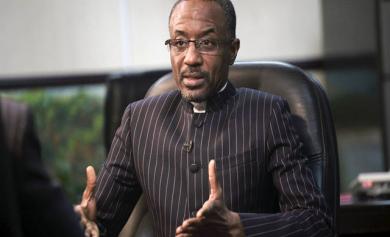
Apparently moved by reactions to their perceived approval of Islamic banking and cash withdrawal limit policies as proposed by the governor of the Central Bank of Nigeria, Sanusi Lamido Sanusi, members of the House of Representatives have denied that they ever endorsed the policies.
The governor of CBN last Thursday honoured a summon’s by the lawmakers to explain what the two policies were about with a view to educating them more on the modalities and processes involved.
After Sanusi’s long speech on the policies, the legislators had applauded him on his presentation before the deputy speaker, who presided on that day, asked him to take his leave, thereby leaving out any question or contribution from his colleagues.
“A number of us or all of us are satisfied with your presentation, we are better enlightened on the issues,” the deputy speaker, Hon Emeka Ihedioha, had stated.
But during yesterday’s plenary session, the lawmakers raised objections to reports that they had endorsed the policies as explained by the governor, noting that all they had done was listen to his explanation without taking a definite stand.
The lawmakers had gone into about an hour long executive session where they addressed matters arising from the meeting with the CBN governor as well as their conduct at the event. Many of them had applauded the governor, an act considered “unparliamentary” according to their rules.
Briefing the press after the plenary session, the chairman of the ad-hoc committee on media and Publicity, Hon Opeyemi Bamidele (ACN, Lagos State), said they noted that there has been an “attempt to draw conclusions to the effect that the House of Representatives has endorsed Islamic banking as proposed by the CBN”.
He emphasised that “we want to make the position clear that the House of Representatives has not by any means and whatever grounds whatsoever endorsed Islamic banking”, adding that the decision not to make the briefing by Sanusi interactive was not out of place as the presiding officer can choose to make it interactive or ask the person to “take a bow”.
“There is no rule that says that if any public officer appears before the parliament, questions must be asked,” he noted.
Attempting to defend the deputy speaker’s decision not to allow questions, he said that it was borne out of the recognition that the proposed policy was a sensitive one which touches on religious and ethnic issues and could be worsened by sentiments.
“Nigeria doesn’t need overheating now and taking on the CBN and asking questions after all issues raised by the governor could have led to a situation which no one will be able to predict”.
He however gave assurance that the House will discuss and take a stand on the two proposed policies in the “best interest of Nigerians.”
In a related development, the Anambra State government has roundly denied Sanusi’s allegation that it collected loans from an Islamic bank.
Leader of Anambra caucus in the House of Representatives Hon Uche Ekwunife (Anambra/PDP) yesterday presented a letter from the Anambra State government which described Sanusi’s assertion as false.
Ekwunife requested, among others, that the lawmakers should compel Sanusi to retract the allegation.
“The CBN governor misinformed Nigerians that Anambra State government took a loan from a non-interest bank,” she said. “Anambra State has never at anytime solicited or taken any loan from an Islamic bank.
“We are not taking this information lightly. We should get the CBN governor to apologise for the misinformation.”
Meanwhile, the CBN has increased its benchmark interest rate for the fourth time this year, as a means of checking inflation which is currently threatened by rising wages and higher energy costs.
It increased the benchmark interest rate by 75 basis points from 8 per cent to 8.75 per cent.
The move is geared towards checking increased public spending ahead of the implementation of the new Minimum Wage Act.
These decisions were taken to proactively tighten the huge injection of liquidity in the third quarter arising from huge wage bill from the payment of the N18, 000 minimum wage to public servants.
It is also meant to curtail the huge injections of N1.3tn disbursed recently as statutory allocations among the three tiers of government.
?

